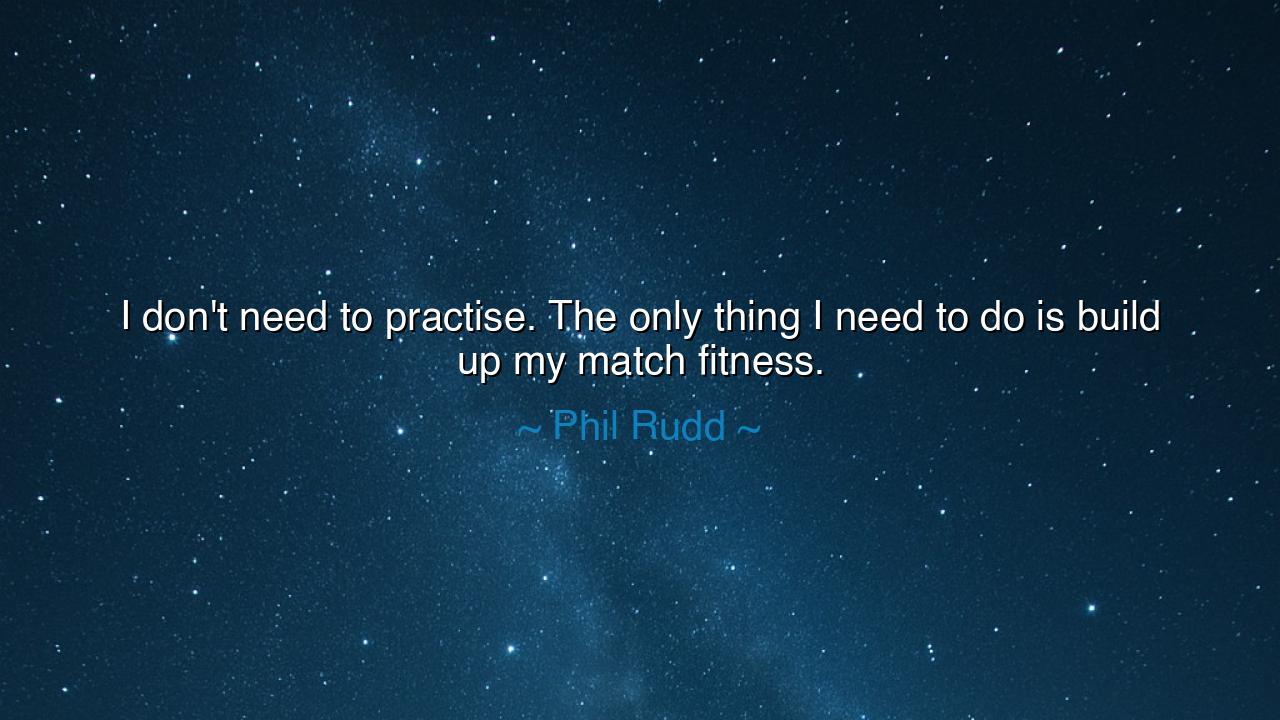
I don't need to practise. The only thing I need to do is build up






Host: The room feels casual, the kind of laid-back atmosphere where Jack and Jeeny can reflect on Phil Rudd’s bold statement with ease. The simplicity of his words about practice and fitness seems to carry a deeper implication about confidence, preparation, and the nature of expertise. Jack leans forward slightly, intrigued by what Rudd’s words might be hinting at.
Jeeny: "Phil Rudd once said, 'I don't need to practise. The only thing I need to do is build up my match fitness.' That’s such a confident statement, right? It’s like he’s saying he’s already reached a level of expertise where practice isn’t necessary for him anymore—it’s all about getting into the right physical condition for the task at hand. What do you think he means by that?"
Jack: He smiles slightly, clearly amused by the confidence in Rudd’s words. "I think Rudd is speaking from a place of mastery. He’s probably reached a point where the basics are second nature to him. When you’ve been doing something for so long, like playing drums in a band or competing at a high level, it’s less about practicing the fundamentals and more about getting your body in the best possible condition for performance. It’s about match fitness, or being prepared to perform at your best when the time comes. It’s a shift from practice to performance." He pauses thoughtfully. "I think what he’s really saying is that once you’ve mastered the skills, it’s not about constantly refining them—it’s about maintaining your physical and mental readiness."
Jeeny: "That makes sense. It’s like once you’ve reached a level of proficiency, fitness and stamina become the key factors for success. He’s not worried about practicing the same basic steps, but making sure his body can handle the demands of the performance or the match. It’s almost like he’s saying, 'I’ve already put in the work, now I just need to stay in shape and be mentally sharp when the moment comes.'" She smiles a little, clearly intrigued. "It’s a shift from building skill to maintaining it—it's about staying ready, rather than always pushing forward to learn more."
Jack: "Exactly. And there’s a kind of confidence in that, right? To say, 'I don’t need to practice anymore,' suggests that you trust in your own abilities and the work you’ve already put in. It’s not that he doesn’t value improvement, but rather, at a certain point, it becomes less about incremental gains and more about sustaining what you’ve already mastered. That’s a different kind of preparation—it’s not about perfecting, but about ensuring you can perform at your peak." He shrugs, his tone casual but reflective. "It’s a mindset that goes beyond physical fitness—it’s about trusting yourself and being in the right state of mind for the challenge."
Jeeny: "That’s an interesting shift in perspective. I think a lot of people, myself included, sometimes get caught up in thinking that more practice is the key to success, but Rudd’s quote reminds us that once we’ve reached a certain point of mastery, the focus should really be on maintenance—keeping our body and mind sharp, staying in the best possible condition to deliver when it counts. It’s about being prepared rather than always striving to be better in the traditional sense." She smiles, clearly appreciating the nuance of the statement. "Maybe the real secret to success isn’t just constant practice—it’s knowing when to switch your focus to performance readiness."
Jack: "Exactly. It’s the idea that preparation isn’t just about adding more—sometimes it’s about keeping what you’ve already built strong and ready for action. And in some ways, that’s harder than practicing—it requires confidence, discipline, and the ability to trust yourself when the stakes are high." He chuckles, a light-heartedness returning to his tone. "It’s like, once you’ve got the skills, it’s not about doing more work—it’s about being able to perform under pressure and stay at the top of your game."
Host: The conversation settles into a quiet understanding, the complexity of Rudd’s words about mastery, confidence, and performance readiness leaving both Jack and Jeeny with a new perspective on preparation. It’s not just about more—it’s about maintaining, staying fit, and being in the right frame of mind when it’s time to perform.
As the evening continues, their reflections linger, a reminder that mastery isn’t always about constant practice—it’s about keeping what you’ve built ready, sharp, and strong. Sometimes, the best preparation is simply trusting in what you’ve already learned and ensuring your body and mind are ready to deliver when it matters most.






AAdministratorAdministrator
Welcome, honored guests. Please leave a comment, we will respond soon